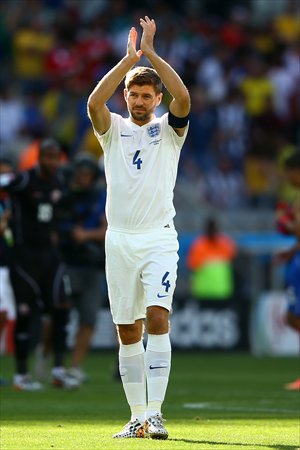HOME >> SPORTS
Gerrard calls time on England
Source:Reuters Published: 2014-7-25 5:03:02
Liverpool skipper caps 114 appearance for Three Lions

Steven Gerrard of England acknowledges the fans after a 0-0 draw during the match against Costa Rica during the FIFA World Cup on June 24 in Belo Horizonte. Photo: CFP
At his best a midfield marauder who inspired teammates and scored goals in equal measure, Steven Gerrard retired on Monday from England duty as the country's third most-capped player after an international career that promised more than it delivered.
His relatively disappointing tally of 21 goals in 114 appearances, including several important and some spectacular strikes, reflected one truth about the Liverpool skipper - that, for all his glorious talents, he was ultimately an unfulfilled, if natural and respected, leader for England.
He and his many admirers will hope that his well-struck opening goal in England's 5-1 victory against Germany in Munich in the qualifiers for the 2002 World Cup finals lasts longer in the collective memory than the misplaced header that led to Luis Suarez's second goal in Uruguay's 2-1 win over England in Brazil.
That mistake may, however, have proved to be a decisive factor in the decision to end his international career, aged 34, and not risk a prolonged decline in the qualifiers for Euro 2016.
No longer the explosive force of his youth, he had become a pedestrian midfield playmaker who struggled for the pace and space needed to exploit the range of his right-foot passing or shooting.
One-club man
As one of a group of promising players dubbed "the golden generation" by the British media, much was expected of the passionate Liverpudlian, born in Whiston on Merseyside on May 30, 1980.
Tall and athletic, he combined power with technique and an insatiable competitive instinct. Gerrard could play anywhere on the right side of the pitch from fullback to forward, his right-foot shot and passing always catching the eye more than his positional sense, though that improved sufficiently for him to become, in his 30s, a deep-lying holding player.
Having established himself as a midfield powerhouse for Liverpool, his only club, he was given his England debut one day after his 20th birthday when another former Liverpool icon, Kevin Keegan, selected him to face Ukraine on May 31, 2000.
England won 2-0 and Gerrard did enough to secure his passage to the Euro 2000 finals, where he made his major tournament debut, as a substitute for Michael Owen, in a hard-earned 1-0 win over Germany in Charleroi, England's first win over their great rivals since the 1966 World Cup final.
It is a measure of his quality that he featured so prominently in that more spectacular triumph in Munich the following year, when Michael Owen scored a hat trick, before Germany gained revenge when they beat England 4-1 in Bloemfontein at the 2010 World Cup.
By then, Gerrard - who missed the 2002 World Cup through injury - was captain, a role that appeared to suit him, even if it also limited his freedom in an era of tighter tactics that meant his roving style left gaps, which were punished or left England overstretched.
Shone again
His box-to-box energy and commitment saw him shine during the Euro 2004 finals in Portugal, where England reached the quarterfinals under Sven-Goran Eriksson, who had made him captain for the first time for a friendly in March 2004.
Gerrard shone again at the Germany 2006 finals, scoring twice in five outings, as England went out in the quarterfinals beaten 3-1 on penalties by Portugal. Gerrard, alas, was one of three England men who failed to score from the spot.
By 2010, under Fabio Capello, he was captain for the tournament in South Africa, an honor he enjoyed 38 times, placing him fifth in the all-time list. He did the same for Roy Hodgson at Euro 2012 and then in Brazil, thus leading England in three of his six international tournaments.
Unhappily, for him and England, his final appearance came in Belo Horizonte, in a "dead rubber" group game, when he came on as a substitute in a 0-0 draw with Costa Rica on June 24. The squad flew home from Brazil the same night amid rumors that their captain was considering his future.
A month later, he has departed with dignity, thanking Hodgson for giving him the captaincy on a permanent basis, a move that, Gerrard said, made him "the proudest man in the country and allowing me to fulfill my childhood dream."
Never less than entirely patriotic, Gerrard will continue to play for Liverpool - in a holding role - and act as an ambassador for England. "He was a tremendous captain and an exceptional role model," said Hodgson. "We shall miss him."
Posted in: Feature, Soccer